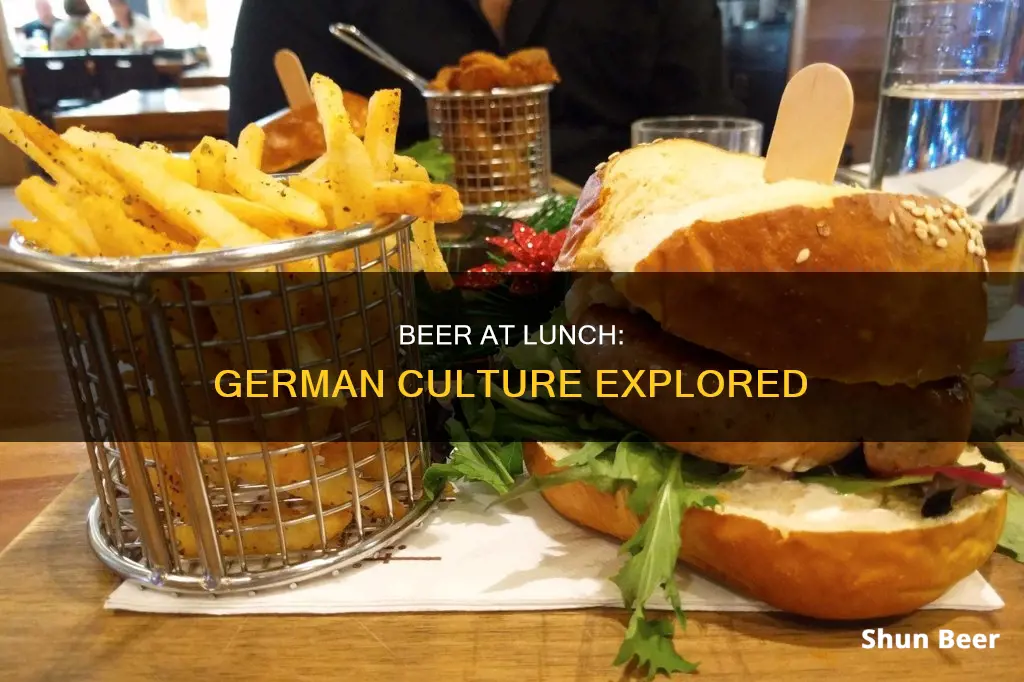
In Germany, drinking at all hours—including during work—is considered normal. Germans even have a special word for an end of work beer: Feierabendbier. German history and culture are synonymous with beer, and the enactment of the Beer Purity Law popularised beer to the point where Germans created their own set of beer-drinking traditions that are still followed today. While it may be frowned upon in other countries, drinking beer during lunch is a part of German culture, especially in Bavaria, where a specific beer is consumed before noon called hefeweizen.
What You'll Learn

Beer is considered a soft drink in Germany
Germany is well-known for its love of beer, and drinking during the daytime is a common occurrence. In fact, Germans even have a special word for an "end-of-work" beer – the "Feierabendbier". This culture of drinking at all hours is normalised in Germany, and it is socially acceptable to drink beer on your commute or during work.
The country's history and culture are synonymous with beer, and while it may not have been invented there, the Beer Purity Law popularised beer to the point where Germans created their own set of beer-drinking traditions. This law, which is still in effect, mandates that beer is made only from hops, barley, and clean water, ensuring a high-quality product that does not negatively impact health when consumed responsibly.
Beer is considered a soft alcoholic drink in Germany, and it is viewed as part of social life, especially for younger adults. The legal drinking age for beer and wine in Germany is 16, while for distilled spirits like vodka or whiskey, it is 18. This differentiation reflects the cultural acceptance of beer as a lighter alcoholic beverage. Germany also has strict laws regulating alcohol use and sale, with a strong emphasis on youth protection. While a 16-year-old can legally drink beer, they are also educated on drinking reasonably and responsibly.
The tradition of drinking beer at lunch or before noon is particularly prominent in Bavaria, a federal state in southeastern Germany. Bavarians may drink beer at any time of day, but it is often consumed during their second breakfast, called "brotzeit", usually around 11 am. The specific beer enjoyed during this time is called "hefeweizen", made from malted wheat and featuring unique yeast strains that produce overtones of clove, banana, apples, citrus, and even smoke. This beer is also unfiltered, giving it a cloudy appearance.
The approach to beer in Germany is different from in other countries, such as the United States. Bavarians don't view beer as a drink that leads to foggy-headedness and laziness; instead, it is simply part of their diet. This is evident in their tradition of Frühschoppen, which refers to drinking an alcoholic beverage before midday in company.
So, while beer is considered a soft drink in Germany in the sense that it is a socially accepted part of their culture, it is still recognised as an alcoholic beverage and consumed responsibly, with a strong emphasis on youth protection and education.
Beer Intolerance: Why Some People Can't Drink It
You may want to see also

Germany has strict laws regulating alcohol use and sale
The country's laws reflect a cultural acceptance of beer as a soft drink, with public consumption considered normal and even encouraged through traditions like "Feierabendbier" (end-of-work beer). Despite this relaxed attitude, Germany has rules in place to prevent underage drinking and promote responsible alcohol use. For example, it is illegal to sell alcoholic drinks to anyone under 16, and those under 18 are prohibited from purchasing distilled spirits. Minors are also restricted in how long they can stay in public places like restaurants and bars, with unaccompanied children under 16 only allowed during specific hours.
Germany also has laws that regulate drinking and driving, with strict penalties for drunk driving, including license revocation and fines. The country employs a points system for traffic violations, and the severity of the punishment increases with the level of impairment.
In terms of marketing, Germany has the Federal Protection of Minors Act, which prohibits alcohol advertising directed at children and adolescents. The country also has the Interstate Treaty for the Protection of Minors from Unsuitable Media Content, which provides multiple avenues for complaining about inappropriate alcohol marketing. Additionally, the Code of Conduct on Commercial Communication for Alcoholic Beverages, established by the German Advertising Council, allows for complaints about marketing practices and can impose sanctions.
While Germany's laws around alcohol use and sale may seem lenient compared to some countries, the nation has a range of regulations in place to promote responsible drinking, protect minors, and ensure public safety.
Drinking Beer While Taking Allegra: What You Need to Know
You may want to see also

The Beer Purity Law is still in effect today
In Germany, drinking at all hours—including during work—is commonplace. Germans even have a special word for an "end of work" beer: "Feierabendbier". This phenomenon may be due, in part, to the Beer Purity Law, which is still in effect today.
The Beer Purity Law, or "Reinheitsgebot" in German, is a series of regulations that limit the ingredients in beer in Germany and the states of the former Holy Roman Empire. The best-known version of the law was adopted in Bavaria in 1516 and stipulated that only hops, barley, and water could be used to make beer. This ensured that beer was of high quality and did not have adverse health effects when consumed responsibly.
While the Beer Purity Law has undergone some changes since its inception—for example, yeast was added to the list of permitted ingredients in 1906 when its role in fermentation was discovered—its basic tenets remain intact. Modern versions of the law declare that only malted barley, wheat, rye, hops, water, and yeast are permitted ingredients in beer. The law also forbids the use of extenders such as rice, corn, and sorghum, which are often used by American brewers to create a lighter taste and reduce brewing costs.
The Beer Purity Law has had a significant impact on the brewing industry in Germany and beyond. It is credited with helping to establish German beer's worldwide reputation for taste and quality. Additionally, the law has influenced brewing traditions and cultures, such as the German tradition of drinking beer before noon, known as "Frühschoppen".
Bavarians take great pride in brewing their beer according to the Reinheitsgebot, seeing it as a sign of tradition and quality. In 2013, the German Brewers Association nominated the original text of the Reinheitsgebot as an intangible cultural heritage under the UNESCO Convention for the Safeguarding of Intangible Cultural Heritage. This nomination underscores the enduring significance of the Beer Purity Law in German culture and its continued influence on brewing practices today.
Beer and Injections: What's Safe to Drink?
You may want to see also

Germans have a special word for an end of work beer: Feierabendbier
Drinking beer is an integral part of German history and culture. The country even has a Beer Purity Law, which mandates that beer can only be made from hops, barley, and clean water. This ensures that the beer produced in Germany is of high quality and does not have an adverse effect on health, provided it is consumed responsibly. Beer is considered a soft drink in Germany, and individuals as young as 16 can legally consume it.
Given this background, it is not surprising that Germans often drink during office hours or even on their commute back home. They even have a special word for an "end-of-work" beer: "Feierabendbier."
In Bavaria, a federal state in southeastern Germany, drinking beer before noon is a tradition. Bavarians have a linguistic term, "Frühschoppen," which means an alcoholic drink before midday in company. They also have a specific beer for this time of day called "hefeweizen," made from malted wheat instead of barley, with specialized yeast strains that produce overtones of clove, banana, apples, citrus, and even smoke.
While drinking beer at work or during lunch may be frowned upon in some countries, it is generally accepted in Germany, especially in certain industries and smaller companies. However, some German companies have a no-alcohol policy, and drinking on the job may be unsafe for certain professions.
So, while Germans do have a special word and tradition for an end-of-work beer, it is important to note that drinking during the workday is not universally accepted in the country, and it may depend on the specific work environment and company culture.
Beer and Blood Pressure Medicine: Safe Mix?
You may want to see also

Drinking before noon is part of German culture
In Bavaria, drinking a beer before noon is simply part of the culture, and they even have a linguistic term for an alcoholic drink before midday in company: Frühschoppen. While it may be frowned upon in other countries, it is normal and accepted in Germany, especially in Bavaria. In fact, Germans have a special word for an "end of work" beer: Feierabendbier. This is because German history and culture are synonymous with beer. The enactment of the Beer Purity Law popularised beer to the point where Germans created their own set of beer-drinking traditions that are still followed today.
In Germany, beer is considered a soft drink and can be consumed in public by individuals as young as 16. Hard spirits and liqueurs, on the other hand, can only be legally consumed by those over 18. Germany also has strict laws regulating alcohol use and sale, with a strong emphasis on youth protection. As a result, while it is normal for a 16-year-old to sip a can of beer, they are also educated on how to drink reasonably and responsibly.
Given this background, it is not surprising that drinking during office hours or even on the commute home is common in Germany. Whether this cultural tradition of drinking before noon will be embraced by the rest of the world remains to be seen.
Melatonin and Beer: Is It Safe to Mix?
You may want to see also
Frequently asked questions
It is not uncommon for Germans to drink beer at lunch, especially in the federal state of Bavaria, where it is customary to drink beer before noon. However, it is not as widely accepted in other parts of Germany, and some companies have rules against drinking alcohol during work hours.
In Bavaria, drinking beer before noon is considered part of the culture, and they even have a specific beer for this time of day called hefeweizen, which is believed to aid digestion. Bavarians also view beer differently, considering it a part of their diet rather than something that impairs productivity.
While drinking beer at lunch may be acceptable in some German workplaces, it is important to note that cultural norms may vary across different countries. For example, in Norway, drinking alcohol during lunch breaks is generally frowned upon, and it may be considered inappropriate in certain industries or situations, especially if it affects job performance or safety.







